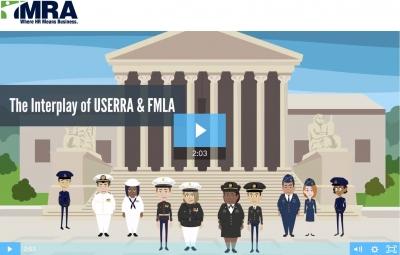When faced with a leave of absence request related to the military, oftentimes employers think of the military leave provisions under the Federal Family Medical Leave Act (FMLA), but overlook the Uniformed Services Employment and Reemployment Rights Act (USERRA).
In a nutshell, the military leave provisions under the FMLA provide job protection to family members of a servicemember or veteran. When a servicemember or veteran requests leave for their own responsibilities to the military, this leave is covered under USERRA. Let’s take a closer look at the various leave protections available to servicemembers, veterans and their families.
FMLA Leave
The FMLA provides job-protected leave to a military’s family member in the following two situations:
| FMLA Military Leave Type | Summary of leave |
|---|---|
|
Qualifying Exigency Leave for this reason is typically shorter in nature, or intermittent, providing employees with job protected leave to attend meetings, events and appointments. |
Eligible employees may take FMLA leave for a qualifying exigency while the employee's spouse, son, daughter, or parent (the military member or member) is on covered active duty or call to covered active duty status (or has been notified of an impending call or order to covered active duty). Exigency Examples: to attend a military event such as a ceremony, to attend family support or assistance programs, to arrange alternative childcare arrangements, to update financial or legal arrangements. |
|
Leave to care for a covered servicemember with a serious injury or illness (military caregiver leave) Eligible employees can take up to 26 workweeks of protected leave in each single 12 month FMLA period. |
Eligible employees may take FMLA leave to care for a family member who is: A current member of the Armed Forces, including a member of the National Guard or Reserves, who is undergoing medical treatment, recuperation, or therapy, is otherwise in outpatient status; or is otherwise on the temporary disability retired list, for a serious injury or illness. A covered veteran who is undergoing medical treatment, recuperation or therapy for a serious injury or illness. Covered veteran means an individual who was a member of the Armed Forces (including a member of the National Guard or Reserves), and was discharged or released under conditions other than dishonorable at any time during the five-year period prior to the first date the eligible employee takes FMLA leave to care for the covered veteran. |
USERRA Leave
USERRA provides job protection and benefit rights for veterans and members of the active and Reserve components of the U.S. armed forces. USERRA applies when an employee requests leave to attend military training, ceremonies and events, call-ups during emergencies, reserve drills and active duty. USERRA also prohibits discrimination against an individual based on past military service, current military obligations or the intent to serve in the future.
While on military leave, the employee has the right to be reemployed in the job that they would have attained had they not been absent for military service with the same seniority, status and pay, as well as other rights and benefits determined by seniority. Employees are entitled to up to five years of job protected military leave; some training and drills are not counted towards this five year cap.
Here are some common USERRA considerations:
1. An employee is called to active duty for two years. How does USERRA apply?
During this timeframe, the employee should remain employed and placed on job-protected military leave of absence. Before the leave begins, meet with the employee to discuss health insurance benefits during leave as they may have benefits through the military, and may wish to change benefits through the employer during their leave.
When the employee returns from active duty, USERRA provides the individual with 90-days to contact the employer to make arrangements for their return to work. When the employee returns to work, they are entitled to the same position, pay and benefits as if they had not left. For example, if during this timeframe the employer provided employees with an average 3% merit increase annually, the employees pay should be adjusted to reflect this increase. Additionally, if the employee would have met seniority to allow for greater vacation and other benefits, this adjustment should be made.
2. An employee is a member of the reserves and attends training one extended weekend per month, impacting their ability to work two days each month.
The employer must accommodate this reoccurring leave. The employer cannot require the employee to use vacation or PTO during their military leave and they cannot adjust the employees schedule so that their military leave falls on a scheduled day off. Notice to the employer of military commitments can be provided either verbally or in writing; the employer cannot request documentation in writing from the employee.
If the employee is non-exempt, unless the employer policy provides for paid military leave, the military leave can be unpaid. However, if the employee is an exempt employee, under the Fair Labor Standards Act, employers are prohibited from docking an exempt employee’s pay for military leave in a workweek where the employee performs work. Exempt employees must be paid their full salary any workweek in which they perform work and take military leave.



